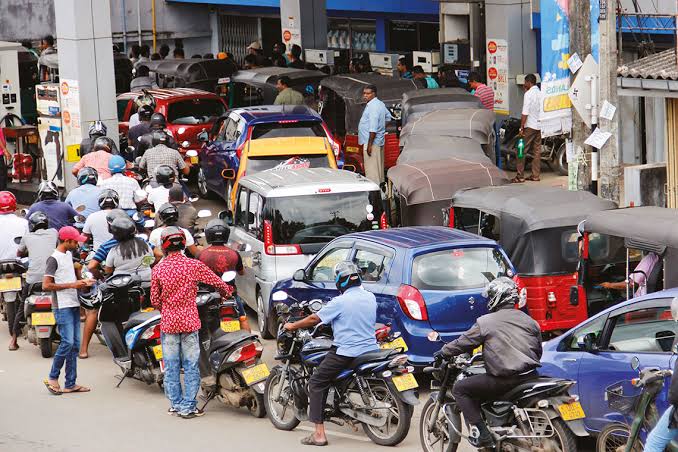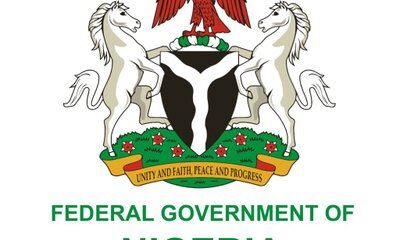News
PWDs must be protected, granted equal access to services

Over 35 million persons are currently living with disabilities in Nigeria, the executive secretary of the National Commission for Persons With Disabilities (NCPWD), James Lalu has confirmed.
Persons with disabilities in Nigeria include individuals who have physical, sensory, intellectual, or mental impairments that may hinder their full and effective participation in society. This encompasses a wide range of conditions such as mobility impairments, visual or hearing impairments, cognitive disabilities, and mental health conditions. They face various challenges in accessing education, employment, healthcare, and other essential services, often due to societal barriers and inadequate support systems.
In January 2019, then Nigerian President, Muhammadu Buhari, signed a historical piece of legislation — Discrimination against Persons with Disabilities (Prohibition) Act 2018, after several years of advocacy by disability rights activists.
The Discrimination against Persons with Disabilities (Prohibition) Act 2018 covers a wide array of rights, including the prohibition of discrimination against persons with disabilities in various sectors, such as education, employment, healthcare, and public transportation.
Recently, the son of Gbenga Daniel, former governor of Ogun state, Debola Daniel, had posted on his official X (formerly Twitter) page about his experience at KFC, MMIA branch.
According to Daniel, the restaurant had stopped him and his family from entering, stating that “no wheelchairs were allowed.”
“Just as we were about to sit, the lady at the till – who was the manager – called out loudly, ‘No Wheelchairs Allowed’,” he posted.
“She refused to listen to reason and stood her ground that at KFCNigeria Murtala Muhammed branch, wheelchairs and wheelchair users of all shapes and sizes were not permitted in the premises and we should leave immediately.
“I have never been the type of person to make a fuss or complain about my disability.”
Following the development, Federal Airports Authority of Nigeria (FAAN) shut down Kentucky Fried Chicken (KFC), an international fast food restaurant chain, at the Murtala Muhammed International Airport, Lagos, over discrimination against a passenger
In a statement on Thursday, Director of Public Affairs and Consumer Protection at FAAN, Obiageli Orah, said the authority had investigated the matter and made their decision.
KFC said the treatment does not reflect its standards and will act swiftly to rectify it.
“KFC is unwavering in our stance against bias or discrimination in any form, with inclusivity and respect as non-negotiable pillars of our values. However, this recent incident has underscored the pressing need for immediate action. We have embarked on efforts to address the situation,” KFC Nigeria wrote on its X (formerly Twitter) platform Thursday afternoon.
“We deeply regret the frustration and distress experienced by our guest and extend sincere apologies to those affected. In response, we are urgently implementing inclusion training for all our employees. ”This incident is not reflective of our standards, and we will act swiftly to rectify it. We are actively exploring actions to equip our team members and restaurants better to ensure that every guest feels genuinely welcomed and that we deliver empathetic customer service that proactively addresses the diverse needs of each guest.”
Following the quick response of the FAAN by shutdown KFC has raised many questions to answer: do over 35 million persons currently living with disabilities in Nigeria get the same treatment as the son of a former governor? Despite signing Discrimination against Persons with Disabilities into law in Nigeria, do people in education sectors, places of work, and public transport among others abide by the law?
It is high time to treat all Persons With Disabilities equally by ensuring that they get the same rights, opportunities, and access to services as everyone else in society, and governments at all levels domesticate the laws that protect them .
News
LASG cracks down on illegal structures along vital drainage channel


By Sodiq Adelakun
The Lagos State Ministry of Environment and Water Resources has launched an enforcement drive to reclaim the System 1 Drainage Channel, a critical waterway located in Ojota and Ogudu.
Commissioner Tokunbo Wahab announced the initiative on Monday via his official social media handle.
According to Wahab, an inspection conducted on Sunday revealed that property owners were building new structures within the designated areas, posing a threat to the channel’s functionality.
Established in 1974, System 1 is the largest primary channel responsible for mitigating flood-related challenges in major parts of the Lagos mainland, including Ogudu, Ojota, Ifako, Gbagada, and Maryland.
He added, “The state had been having discussions with property owners/residents since 2021, and the conversation ended in November 2023.
“Contravention notices have been served to owners of buildings lying within 140 metres of System 1 since 2021, but we found out that people have gone back to encroaching on the right of way and alignments.
“The property owners whose buildings fall within the approved 140 meters Right of Way of the channel had been given the option of voluntary compliance for almost three years.
“Some of the property owners continued with the construction of new buildings that surfaced in the areas now.”
Wahab also disclosed that the Ministry is set to commence major maintenance dredging at Okota, Faseun Bridge System 6E, located off Ago Palace Way.
It was gathered that in response to flooding threats, the Lagos State Government commenced a dredging operation in the Ikorodu area, targeting the primary channel in Awobo Estate.
The initiative was a significant step towards preventing potential disasters and ensuring the safety of residents in the region.
News
Lagos commuters beg for relief as petrol scarcity bites harder


..Marketers lament, urge Govt to act fast
By Sodiq Adelakun
Lagos commuters faced a difficult Monday as the lingering petrol scarcity continued to bite, leaving many stranded at bus stops across the city.
The crisis deepened as motorists scrambled to fill-up at dispensing stations, leading to a hike in fares.
With many filling stations shut and others selling the scarce commodity at exorbitant prices, tricycles and buses – the lifeline for daily commutes – were scarce, struggling to access fuel.
Some motorists revealed to NewsDirect that they purchased petrol at N900 and N1,000 per litre at filling stations, while roadside dealers sold the product for as high as N1,200 and N1,300 per litre.
The situation worsened as many filling stations stopped selling fuel altogether, exacerbating the woes of commuters who were forced to pay inflated fares or trek long distances to their destinations.
In most of the bus stops visited by NewsDirect on Monday, survival of the fittest was the prevailing philosophy as hordes of commuters were seen running after a few commercial buses.
However, chaos erupted at bus stops across Lagos on Monday as observed by our correspondent when desperate commuters scrambled to secure a spot on the few available commercial buses.
The transportation system has been thrown into disarray, leaving many wondering when the situation will improve.
Recall the crisis began after President Bola Tinubu announced the end of the petrol subsidy regime on May 29, 2023, aiming to allow market forces to determine pump prices, boost government revenue, and reduce disruptions in the value chain.
However, the move has triggered severe petrol scarcity, leading to a hike in fares across Lagos.
Commuters are feeling the pinch, with fares skyrocketing by as much as 50 percent.
For example, the journey from Kola roundabout to Agege, which previously cost N400 or N300, now costs N800. Similarly, the trip from Agege to Alausa in Ikeja has increased from N300 to N400.
According to one of the commuters, Temitope, he said, “Oh my goodness, I can totally relate to this! I was at the bus stop yesterday and it was like a war zone! People were pushing and shoving, trying to get on the few buses available.
“I was lucky to get on one, but I had to pay N800 for a journey that normally costs N400! It’s like they’re taking advantage of our desperation. And to think it’s all because of the petrol scarcity caused by the removal of the subsidy.
“I understand the government’s intention, but they should have had a better plan in place to mitigate the effects on commuters like us. This is really tough, and I hope they find a solution soon!”
Also, a female marketer, Promise, has lamented the devastating impact of the ongoing petrol scarcity on her business, echoing the plight of many others in the sector.
She said, “This petrol scarcity is affecting my business so much! I sell perishable goods at the market, and I need to transport them daily from one place to another.
“But with this scarcity, the few buses available are hiking their fares and it’s eating into my profit. I used to pay N400 or N300 from Kola roundabout to Agege, but now they’re asking for N800! And from Agege to Alausa, it’s now N400 instead of N300.
“How am I supposed to make a living like this? The government should do something to help us, we’re suffering! I’m a widow with three children to feed, and this is really affecting my family. Please, something needs to be done urgently!”
News
Q1 2024: BUA Cement’s post-tax profit declines by 34%


BUA Cement Plc, on Monday posted a Profit After Tax (PAT) of N17.97 billion for the period ended March 31, 2024.
This represented 33 per cent decline, as against N26.80 billion recorded in the corresponding period of 2023.
The company revealed this in its audited financial statement for the quarter ended March 31, 2024, which was sent to the Nigerian Exchange Ltd.(NGX) in Lagos.
The statement was signed by Mr Binji Yusuf, Managing Director, BUA Cement, Jacques Piekarsi, Chief Finance Officer, BUA Cement and Mr Chike Ajaro, Finance Director, BUA Cement.
Yusuf said that the firm’s Profit Before Tax (PBT) also dropped by 40 per cent to N21.29 billion in the quarter under review, compared to N35.46 billion recorded in the same quarter of 2023.
He stated that the company’s gross profit went down by 11 per cent to N44.94 billion for the period under review, as against N50.37 billion posted in the corresponding period of 2023.
According to him, the operating profit of BUA cement stood at N33.48 billion at the end of the first quarter of 2024, compared to N38.39 billion recorded in the same period of 2023, representing loss of 13 per cent.
The managing director noted that the cement company’s total asset for the period under review, however, rose by 2.46 per cent to N1.25 trillion, from N1.22 trillion posted in the same quarter of the previous year.
Yusuf said that the firm’s total liabilities advanced by 1.47 per cent as at the end of the first quarter 2024, to close at N842.70 billion, as against N830.46 billion recorded in the same period of year 2023.
The managing director further said that BUA cement’s free float value as at March 31, 2024, stood at N111.12 billion, compared to N69.08 billion recorded in the same period of the previous year.
This is compliant with the Exchange’s free float requirements for companies listed on the Main Board.
-
capital market2 years ago
Rt.briscoe, FBNH, Others halts negative performance of stock market
-
Finance3 months ago
Court orders Sen. Victor Umeh to repay N136m bank debt to AMCON
-



 Abuja Update2 months ago
Abuja Update2 months agoUNDP, FG partnership needed to achieve inclusion, equity- Minister
-
Abuja Update1 month ago
Banks drive stock market performance with N147bn gain
-



 Health3 weeks ago
Health3 weeks agoCapacity training will reduce migration of health workers- NPHCDA
-



 Business2 weeks ago
Business2 weeks agoTingo Group unveils Tingo Electric, Tingo Cola drink at Lagos launch
-



 Infotech1 month ago
Infotech1 month agoWorld Backup Day: NITDA urges Nigerians to ensure backup of data
-
News4 months ago
Oil thieves sponsoring malicious media campaign against Navy – Spokesman






